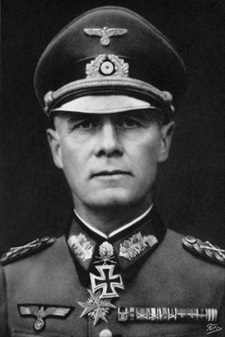ROMMEL, ERWIN (1891–1944)

Rommel was a highly decorated officer in World War I, distinguished for his exploits on the Italian front. Between the two world wars he held battalion commands, served as an instructor at a war college, and authored several military textbooks, catching the eye of Hitler, who asked him to conduct a tour of Hitler Youth meetings and encampments and deliver lectures on German soldiering. Rommel became a regular member of Hitler’s entourage and was greatly admired by Joseph Goebbels, the Reich’s minister of propaganda, who celebrated Rommel’s exploits in the Nazi media.
Rommel, now a colonel, further distinguished himself during the 1940 invasion of Belgium and France (Fall Gelb, “Case Yellow”) as the fearless and confident commander of the 7th Panzer Division, the so-called “Ghost Division” because of its rapid advances and independence, even from the German High Command. However, it was his leadership of German and Italian armored forces in the North African campaign that established his legendary status as the “Desert Fox.”
On February 6, 1941, Rommel was ordered to lead the German Afrika Korps (comprising the 15th Panzer Division and the 5th Light Division) sent to Italian Libya to shore up Benito Mussolini’s demoralized forces, whose numbers had been reduced to 7,000 after 130,000 Italians had been taken prisoner by British Commonwealth forces during the previous three months. Fortunately for Rommel, the British in North Africa were suddenly weakened by the withdrawal of troops to fight the German invasion and conquest of Greece in April 1941. Following the British withdrawal, the German-Italian force pushed into Cyrenaica (Eastern Libya), where Lt. Gen. Rommel sensed the possibility of destroying the Allied presence in North Africa and capturing Egypt. Rommel laid a siege to the mostly British- and Commonwealth-held port town of Tobruk (240 days) until the initiative changed in favor of the British Eighth Army, which forced Rommel back to his starting position.
In 1942 Rommel’s newly renamed Panzer Army Africa (the force would undergo several name changes during the Western Desert Campaign) forced the British back again and captured Tobruk with its 33,000 defenders. Now a Field Marshal, Rommel exploited the weakness of British formations with a thrust into Egypt, a thrust that had the support of Hitler, notwithstanding a significant lengthening of Axis supply lines across Northeast Africa. After the stalemate at El Alamein (First Battle of El Alamein), 66 miles west of Alexandria, Egypt, the British Eighth Army got a new commander, Lt. Gen. Bernard Law Montgomery, who pursued the Germans back to El Alamein for a second battle (October 23–November 4, 1942). (Starting in late September Rommel was on sick leave in Italy and Germany.) Montgomery was able to capture most of the Panzer Army Africa, pressing the remnants all the way to Tunisia. Rommel still was able to inflict a sharp defeat on American forces at the Kasserine Pass in February 1943, several months after large-scale Allied landings in North Africa (Operation Torch). On March 9 he handed over command of Army Group Africa to luckless Gen. Hans Juergen von Arnim and left Africa, never to return. (Von Arnim surrendered his forces to the Allies in May 1943.)
Rommel served briefly in Greece and Northern Italy before being posted to France with responsibility for defending the French coast against the long-anticipated Allied invasion of Festung Europa. Despite reinvigorated fortifications along the Atlantic coast, the Allies mounted a successful invasion on June 6, 1944 (Operation Overlord).
On the evening of July 17, 1944, Rommel was being driven along a French road near the front when his open-top Horch staff car was strafed. The car was forced off the road and Rommel was thrown out of it. Hospitalized in Germany with major head injuries, Rommel had already made up his mind to join the military conspiracy against Hitler. After the failed bomb attack of July 20, 1944, many conspirators were arrested and the dragnet expanded to include Rommel. Instead of dismissing Rommel from the Army in disgrace, Hitler offered the field marshal the choice of committing suicide or facing Roland Freisler’s kangaroo court. Rommel, assured by Hitler that his family would receive a state pension and himself a funeral with full military honors, ingested a capsule of cyanide on October 14, 1944. The truth behind Rommel’s death did not come out until the postwar Nuremberg Trials.
![]()
Rommel vs. Montgomery and the Second Battle of El Alamein, 1942
![]()

 History buffs, there is good news! The Daily Chronicles of World War II is now available as an ebook for $4.99 on Amazon.com. Containing a year’s worth of dated entries from this website, the ebook brings the story of this tumultuous era to life in a compelling, authoritative, and succinct manner. Featuring inventive navigation aids, the ebook enables readers to instantly move forward or backward by month and date to different dated entries. Simple and elegant! Click
History buffs, there is good news! The Daily Chronicles of World War II is now available as an ebook for $4.99 on Amazon.com. Containing a year’s worth of dated entries from this website, the ebook brings the story of this tumultuous era to life in a compelling, authoritative, and succinct manner. Featuring inventive navigation aids, the ebook enables readers to instantly move forward or backward by month and date to different dated entries. Simple and elegant! Click 











